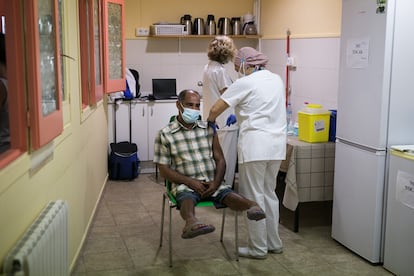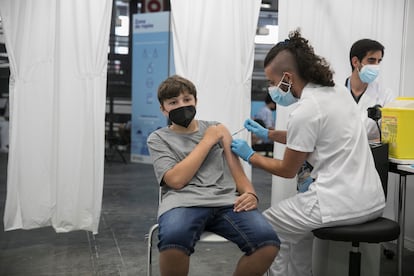As Spain approaches 70% target, who is still to be vaccinated against Covid-19?
The unvaccinated population in the country largely falls into three categories: anti-vaxxers, people with concerns and those who have had an infection and must wait before getting their first dose

In Spain, there are still 7.7 million people aged over 12 who are yet to be vaccinated against Covid-19. The majority are young people who are currently the focus of the campaign, and will be fully inoculated over the coming weeks. But there is also a small section of people among those who were due to be given their shots months ago who are yet to receive a single dose: 7.4% of the 50-59 age group, and 15.4% of those aged 40 to 49.
The vaccination process among these groups is now moving very slowly, in particular among the former, where progress has practically halted. Around two million people in Spain aged over 40 are yet to get a single dose. The experts insist that the overall rate of the injections is very positive, but add that there are segments that are very hard to reach – either because those people cannot, or do not want to, get their vaccines.
Negationists distort the situation and make a lot of noise, but they have little influenceAmós García, president of the Spanish Vaccinology Association
They point to some very clear profiles of who these people are: negationists, those who have doubts, those who have just had the infection and have to wait a while before they can be vaccinated, and even a group whose status is not reflected in the statistics, such as foreign nationals in an irregular situation.
The Valencia region has become the first to launch a campaign to seek out these stragglers. The authorities in the eastern Spanish territory will be sending out messages with a number of possible dates so that they can choose when to get their shots. There is no problem in terms of supply: between the mass shipment of doses that arrives this week, the fact that many people are on vacation and that there are fewer and fewer citizens left to be immunized, some regions, such as Murcia and the Basque Country, even have unfilled appointments and are calling on their residents to come to the vaccination centers.
Spain as a country, however, is still progressing at an enviable speed with its vaccination campaign. With 62.2% of its population having received the full protection offered by the vaccines, only Canada is ahead among the 50 most-populated countries on the planet, according to Oxford University’s Our World in Data website. Spain is yet to see its campaign stall, as has happened in other countries such as the United States, Israel, Germany and France. Experts consulted by EL PAÍS recommend that the process continue in Spain for now without offering incentives nor there being penalties for the unvaccinated, Pablo Linde reports. Fernando García López, the president of the Research Ethics Committee at the Carlos III Health Institute in Madrid, argues that is better to “convince rather than coerce, something that can polarize.” He adds: “In Spain, there is no major anti-vaccination group against which we need to fight, as is happening in other places.”
A survey carried out in June by the FECYT foundation for science and technology showed that barely 4% of citizens are unwilling to receive a vaccine, compared to last October when that figure was practically a third of the population. Amós García, the president of the Spanish Vaccinology Association, argues that the anti-vaccination groups in Spain are “absolutely marginal here, a minority group, who will not have any effect on the vaccination campaign. I wouldn’t waste too much effort on this group,” he argues, because he considers it to be impossible to change their minds.
There are no official figures in Spain about the rates of rejection of the vaccine, nor the exact motives for doing so. Carlos Orquín, 32, is a journalist, but he spent several months as an administrative worker in a hospital in Barcelona, giving out vaccine appointments. He has recounted his experiences to EL PAÍS, explaining that those who refused to accept the appointment either said they didn’t want it or had doubts. Among the former, he explains, they were emphatic, “and the conversation was over immediately” with no room for debate. The latter, however, would explain their reticence but there was room to reassure them. “They were scared and had a lot of doubts,” he explains. “Many of them said that they were going to wait a while.”
The Health Ministry estimates that those who have refused the vaccine account for around 0.6% of the population who have been offered it, but a spokesperson clarifies that this percentage could include those who are anti-vaccines as well as those who did not pick up the phone when they were called. From region to region, the percentage is around 1%. In Castilla-La Mancha, for example, 1.17% have rejected their shots, although the reasons for doing so are not clear. In the Canary Islands, the figure is 1%, while in Valencia, 1.13% of the population has expressly rejected doing so, according to the health chief, Ana Barceló, who was speaking last week. In Andalusia, the rejection rate is 0.63%, according to the regional health department.
The Health Ministry is not concerned about the current rejection rates among the general population, but there is worry about certain collectives, such as staff in care homes and residences. While the percentage is minimal, they are in contact with very vulnerable people and each professional in this group that rejects their injection could cause a tragedy if they should bring the virus into a senior home, for example. At least five of Spain’s regions have already requested obligatory vaccination for these professionals, and in some cases for healthcare workers too, but this is not something that the ministry is planning for now. Last Wednesday, Health Minister Carolina Darias presented a document with technical recommendations that would heighten the precautions being taken in these centers, and that included two tests a week for these unvaccinated employees and even the possibility of changing their jobs.
Vaccinating 100% of the eligible population will be impossible, the specialists agree. To start with, because there will always be a small group who cannot be vaccinated because of medical conditions, whether these are allergies or the combination of the vaccine with another pharmaceutical that they are taking.

Among those who can’t have the vaccine and those who do not want it, are those who have doubts without being radically anti-vaccines. They fear the effects, collateral damage and doubt the efficacy. “They have doubts because they are scared, but these people can be spoken to and there can be dialogue,” explains the president of the vaccinologists. Toni Trilla, the head of epidemiology at the Hospital Clínic in Barcelona, argues that “they can be convinced over time.” There is also a subgroup of “apathetics” here, something that has been seen in countries such as the United States. “They are people who are not thinking about getting vaccinated, they are passing on them,” he explains. “They are on vacation or working and they don’t buy the arguments that this is for their health. I don’t know if we’ll see that in Spain,” he says.
Another collective that can’t be vaccinated, and that is ever bigger after the last wave, the fifth since the pandemic hit Spain, is that of those who have just had Covid-19. According to the Health Ministry’s strategy, if they are under 65, they have to wait six months before they can begin or complete the full vaccination, a time that the Catalan regional government has reduced to two months. In the last half year, more than 1.5 million people have been infected with the coronavirus in Spain. Those who have to wait for their shots due to an infection will be left behind, Infante admits, but he argues that they are not a problem. “Normally they will end up vaccinated because they have seen the writing on the wall.”
Around two million people in Spain aged over 40 are yet to get a single dose
The last group that is evading the system – and even the statistics – are those people in an irregular situation in Spain. They are not even included in the total of 9.2 million people still to be vaccinated because they do not appear on any registers. According to Pedro Campuzano, a reference point for state programs for Doctors of the World, these are mostly people without a health card, such as migrants in an irregular situation or those who do have papers but don’t have access to the healthcare system. These people are included in the vaccine campaign, but it is difficult to reach them. “There are some who may be afraid to have contact with the administration and demand their rights, in particular those who are going to proactively seek their vaccine,” Campuzano explains. “But there is also an effect from hoaxes and they don’t want to get vaccinated, but this has improved over time. One part of our cultural mediation work involves precisely this, education for healthcare.”
Homeless people account for another vulnerable collective, as do those who live in settlements with no fixed abode. These profiles, who are due to receive the single-shot Janssen vaccine, are difficult to locate and require proactive strategies. In Barcelona and Madrid, there have already been specific campaigns for the homeless, and in Seville, there have also been efforts to bring this collective to the vaccination points.
But more proactive strategies are needed, Campuzano argues. “Protocols are in place in the regions, but on the ground it’s not being easy because the rules aren’t known about or people are unaware of the possibilities. There has been no proactive campaign to communicate this possibility,” he explains. “This is one of the bottlenecks.”
The experts explain that once the majority of the population has been vaccinated, campaigns will have to be designed to reach those who have missed out. Amós García says that once the government reaches its target for the end of August of vaccinating 70% of the population, “we need to keep building on this. Negationists distort the situation and make a lot of noise, but they have little influence,” he argues.
Infante agrees that the vaccinations must continue. “We have a month to see how we will end up,” he says. “We will get there with a lot of the over-40 population covered but this will be lower for the under-30s. That is not to say that the youngest people did not want to get vaccinated, but rather that [the campaign] has not worked well for them. The self-appointment system has its limits. There is a need to be proactive and to start calling out again. From September 1, for the 18 to 30 group, they need to be located and offered the vaccine once more.”
English version by Simon Hunter.
Tu suscripción se está usando en otro dispositivo
¿Quieres añadir otro usuario a tu suscripción?
Si continúas leyendo en este dispositivo, no se podrá leer en el otro.
FlechaTu suscripción se está usando en otro dispositivo y solo puedes acceder a EL PAÍS desde un dispositivo a la vez.
Si quieres compartir tu cuenta, cambia tu suscripción a la modalidad Premium, así podrás añadir otro usuario. Cada uno accederá con su propia cuenta de email, lo que os permitirá personalizar vuestra experiencia en EL PAÍS.
¿Tienes una suscripción de empresa? Accede aquí para contratar más cuentas.
En el caso de no saber quién está usando tu cuenta, te recomendamos cambiar tu contraseña aquí.
Si decides continuar compartiendo tu cuenta, este mensaje se mostrará en tu dispositivo y en el de la otra persona que está usando tu cuenta de forma indefinida, afectando a tu experiencia de lectura. Puedes consultar aquí los términos y condiciones de la suscripción digital.









































